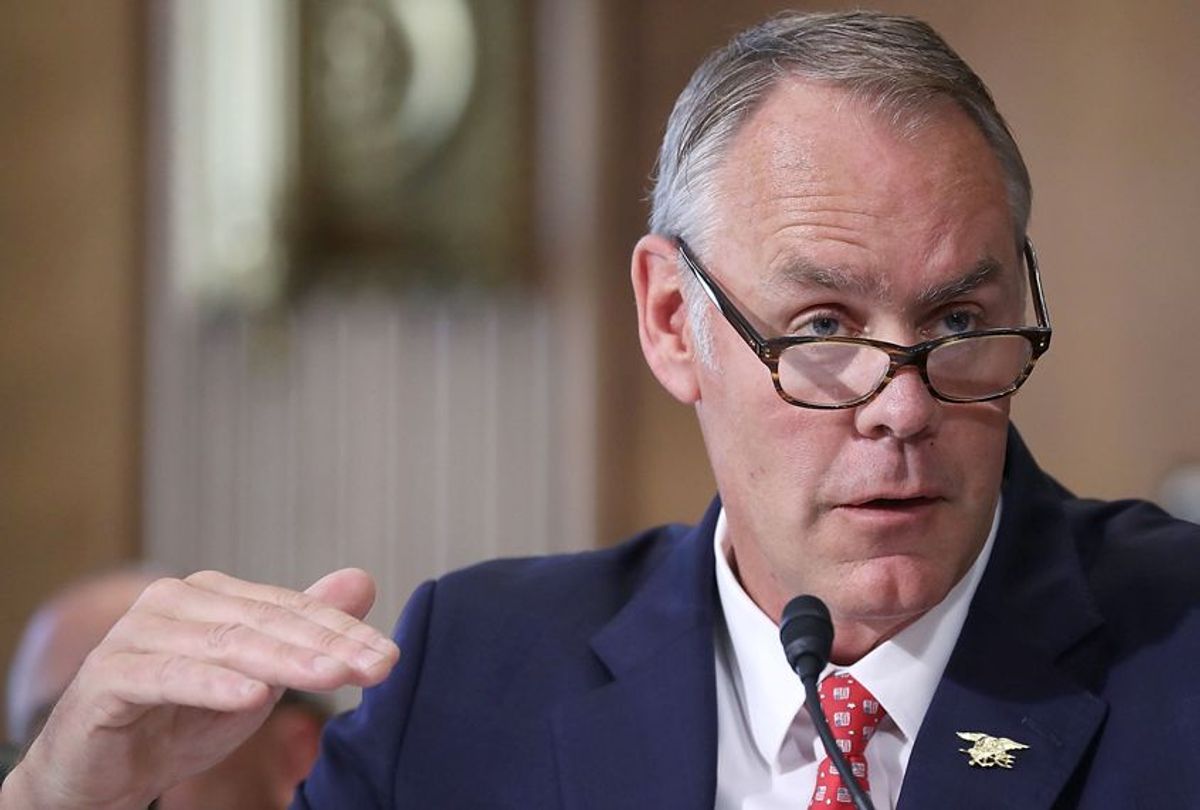During his confirmation hearing earlier this year, future Interior Secretary Ryan Zinke claimed that the taxpayers "should always get fair value" for coal, oil and other resources that private industry extracts from public lands. As with every other creature Donald Trump hired to stock his swamp, he wasn't being truthful.
As Zinke's actions over the last months have made clear, he always intended to do everything he could to let industries take what they wanted from public lands, often without paying anything remotely close to fair value.
Two Democratic attorneys general, Xavier Becerra of California and Hector Balderas of New Mexico, are fighting back. On Tuesday, the two filed a lawsuit against Zinke aiming to stop the Interior Department from reopening a loophole, closed by the Obama administration, that allows coal companies to use accounting tricks to avoid paying full royalties to the taxpayers for what they extract.
It's a story that seems wonky on its surface, but one that exposes both the Trump administration's deep corruption and the harried efforts of Democratic state officials who will use whatever tools they have, in this case lawsuits, to stop the bleeding.
In the summer of 2016, the Obama administration banned extraction companies from using shell company strategies to make coal look cheaper than it is and thereby avoid paying full royalties on it. The Interior Department has admitted that overturning that ban will shortchange the taxpayers and benefit coal companies, to the tune of $60 million to 75 million a year. Yet the department is proceeding with reversing that ban.
"This is yet another example of the Trump Administration bending over backwards to please the oil, gas and, in particular, the coal industry,” said Becerra in a statement. “The President has shown what side he is on, and it is not the side of American taxpayers."
“Sometimes it’s easier for us to see how [the administration] is trying to let the oil and gas industry onto our public lands through the efforts to open the Arctic Refuge or to roll back our monuments," Pam Eaton, the senior adviser for the energy and climate program at the Wilderness Society, told Salon. But Trump officials are also trying to do it, she said, by giving extraction industries "sweetheart deals on what they pay, at the expense of the public."
Greg Zimmerman, deputy director of the Center for Western Priorities, noted that the Obama-era policy "was never a terribly controversial rule" and said "it was always a little bit surprising that it received so much attention" from Zinke's Interior Department.
The intensity with which the Trump administration has gone after this, Zimmerman suggested, is a way "for them to say they’re trying to do something to revive the coal industry." It's more evidence that the White House's well-documented infatuation with coal trumps not just common sense and basic environmental concerns, but also every reputable economic assessment showing that coal is a dying industry.
A thick blanket of sleaze enveloped the efforts to undo this common-sense regulation requiring coal companies to pay Americans a fair price for their natural resources, even before Zinke's confirmation. As Juliet Eilperin of The Washington Post reported earlier this month, a series of leaked emails show that coal company Cloud Peak Energy secured meetings to push for the repeal of the royalties rule -- and found a welcome audience inside the Interior Department. By early March, Interior had already taken action to suspend the rule.
A federal court overturned that suspension in August. By then, the department had already rewritten the rules to give the coal companies a loophole that gets them out of paying fair prices for coal extraction -- with an alacrity largely unheard of in federal bureaucracies,.
Zinke's Interior defended the rapid repeal by claiming that the Obama-era regulation "created confusion and uncertainty regarding how companies report and pay royalties." This excuse is hard to buy under any circumstances, but doubly so when considering the elaborate accounting tricks being used to cheat taxpayers and the government out of a fair price on royalties. Having companies pay directly for what they buy is, in the real world, far simpler than allowing them to play some elaborate shell game in order to artificially lower prices.
The lawsuit filed by Becerra and Balderas describes Zinke's rule change as "arbitrary and capricious because the agency failed to supply a reasoned basis for its wholesale repeal of a Rule which fulfills the agency’s statutory mandate to ensure a fair and accurate return on the use of public resources."
None of this, sadly, is any surprise. Zinke has been shameless about his efforts to turn the Interior Department into little more than a discount leasing office for extraction industries. Under the guise of reforming the royalty system, Zinke put together a Royalty Policy Committee that he claims will put "greater trust and transparency in how we value our nation's public mineral resources." In reality, it's little more than a ruse to sell off public property to private industry at bargain-basement prices.
"Zinke has stacked his committee with trade associations and individual companies that stand to benefit from weakened royalty collection policies," a report from the Center for American Progress explains. "States that are led by Democratic governors were entirely shut out of the primary membership of the committee. Tribal nations that have expressed substantial concerns about the environmental and social impacts of federal oil, gas, and coal policies were likewise excluded from the committee, as were all national fiscal watchdog organizations that represent the interests of American taxpayers."
Becerra and Balderas are betting, however, that the administration's transparent greed and total lack of interest in protecting the American taxpayer will be obvious to federal judges. Trump and his minions may have an irrational and destructive love of coal, but Democratic officials are going to make them fight for it.



Shares